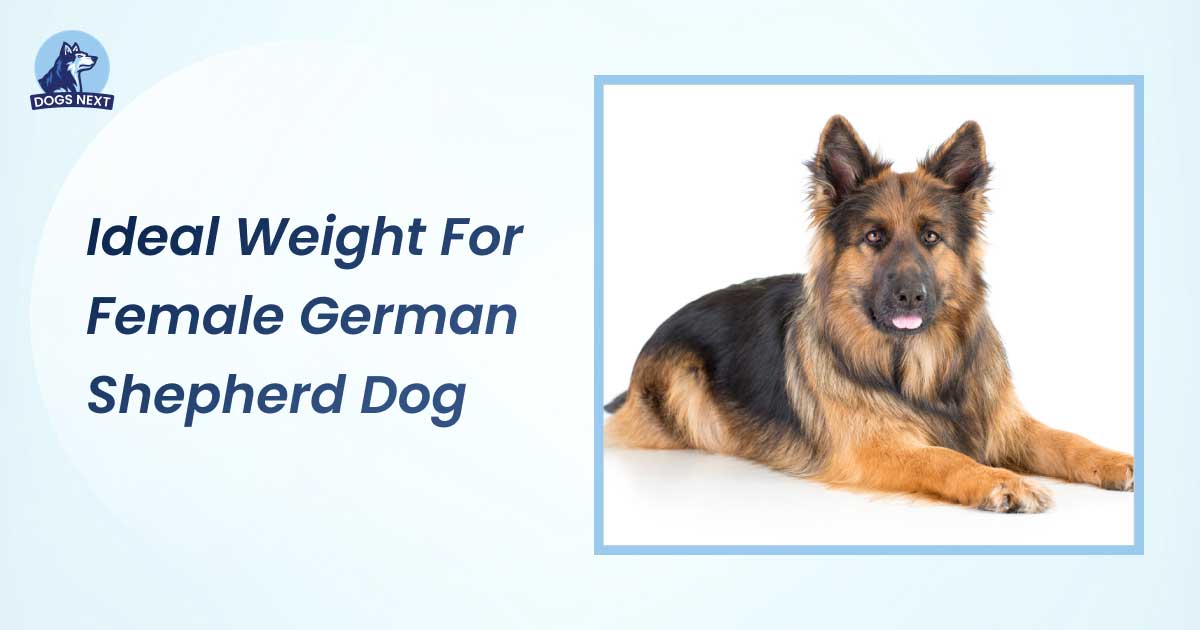The ideal weight for a female German Shepherd Dog ranges from 50 to 70 pounds. Proper weight management is crucial for their health.
Female German Shepherds are known for their intelligence, loyalty, and versatility. Maintaining an ideal weight helps them stay active and healthy. Obesity can lead to various health issues, including joint problems and heart disease. Regular exercise and a balanced diet are essential for their well-being.
Female German Shepherds typically weigh less than their male counterparts. Monitoring their weight helps ensure they live a long, healthy life. Regular vet check-ups can help keep their weight in check. Proper nutrition and exercise are key to maintaining their ideal weight. This ensures they remain energetic and happy companions.
Ideal Weight Range For Female German Shepherds
The ideal weight of a female German Shepherd is crucial for her overall health and well-being. A balanced weight ensures that she stays active, agile, and free from potential health issues. Understanding the ideal weight range helps in maintaining her proper growth and development. Let’s explore the various factors that determine the ideal weight range for female German Shepherds.
Weight Based On Age And Size
The weight of a female German Shepherd varies based on her age and size. On average, adult female German Shepherds should weigh between 50 to 70 pounds (22.7 to 31.8 kg). To help you understand better, here’s a table illustrating the typical weight range based on age:
| Age (Months) | Weight (Pounds) | Weight (Kilograms) |
| 2 | 16-20 | 7.3-9.1 |
| 4 | 31-35 | 14.1-15.9 |
| 6 | 44-49 | 20-22.2 |
| 12 | 60-66 | 27.2-29.9 |
These figures represent an average range. Individual dogs may vary slightly. Regular monitoring is essential to ensure that your female German Shepherd maintains a healthy weight. This helps in avoiding problems like obesity or underweight issues.
Growth Milestones
Understanding the growth milestones of female German Shepherds is important. It helps in tracking her development and ensuring she remains within the ideal weight range. Here are some key growth milestones:
- 2-4 Months: Rapid growth phase. Puppies gain about 5-10 pounds (2.3-4.5 kg) per month.
- 4-6 Months: Continued growth. Weight gain starts to stabilize. Expect around 4-8 pounds (1.8-3.6 kg) per month.
- 6-12 Months: Slower growth phase. Weight gain averages 2-4 pounds (0.9-1.8 kg) per month.
- 12-18 Months: Reaching near adult weight. Smaller increases in weight. Around 1-2 pounds (0.5-0.9 kg) per month.
Regular check-ups with your vet are crucial during these growth stages. They help in ensuring your female German Shepherd is growing healthily. Proper nutrition and exercise play a significant role in maintaining her ideal weight.
Monitoring her growth milestones allows you to make necessary adjustments. This includes changes in diet and activity levels to support her development.
Factors Affecting Weight In Female German Shepherds
The ideal weight for a female German Shepherd Dog (GSD) can vary due to several factors. These factors play a crucial role in determining whether your GSD maintains a healthy weight. Understanding these factors helps in ensuring your dog leads a healthy and active life.
Diet And Nutrition
Diet and nutrition are vital components in managing your female German Shepherd’s weight. A balanced diet ensures that your dog gets all the essential nutrients needed for growth and energy.
Here are some key points to consider:
- High-quality dog food: Choose a dog food that lists meat as the first ingredient.
- Portion control: Overfeeding can lead to obesity, which can cause health problems.
- Nutrient balance: Ensure the diet includes proteins, fats, carbohydrates, vitamins, and minerals.
Below is a table that shows the daily caloric needs based on activity levels:
| Activity Level | Calories per Day |
| Low | 1,200 – 1,400 |
| Moderate | 1,500 – 1,700 |
| High | 1,800 – 2,000 |
Treats and supplements should be given in moderation. Treats can add up quickly and contribute to weight gain.
Exercise And Activity Level
Exercise and activity level are crucial for maintaining a healthy weight in female German Shepherds. GSDs are an active breed, requiring regular physical activity to stay fit.
Here are some exercise routines you can incorporate:
- Daily walks: A minimum of two 30-minute walks per day.
- Playtime: Engage in games like fetch and tug-of-war.
- Mental stimulation: Use puzzle toys to keep their minds active.
Regular exercise helps burn calories and keeps your dog’s muscles strong. A sedentary lifestyle can lead to weight gain and associated health issues.
Below is a table showing the recommended exercise time based on age:
| Age | Exercise Time |
| Puppy (up to 1 year) | 30 minutes |
| Adult (1-7 years) | 1-2 hours |
| Senior (7+ years) | 30-60 minutes |
Engaging in regular exercise helps maintain a healthy weight and overall well-being.
Genetics And Breed-specific Traits
Genetics and breed-specific traits also influence the weight of female German Shepherds. Genetics can play a significant role in determining body structure and metabolism.
Here are some genetic factors to consider:
- Parent’s size: The size of the parents can give an indication of the dog’s potential size.
- Metabolism rate: Some dogs naturally have a faster metabolism.
- Health conditions: Certain genetic conditions can affect weight.
Breed-specific traits such as muscle mass and bone structure also play a role. GSDs are known for their muscular build, which can add to their weight without indicating obesity.
Below is a table showing the average weight range for female German Shepherds at different life stages:
| Life Stage | Weight Range (lbs) |
| Puppy (up to 1 year) | 15 – 70 |
| Adult (1-7 years) | 50 – 70 |
| Senior (7+ years) | 50 – 70 |
Understanding these genetic and breed-specific traits helps in managing your dog’s weight effectively.
How To Monitor And Maintain Ideal Weight
An ideal weight ensures a female German Shepherd’s overall health and well-being. Monitoring and maintaining this ideal weight is crucial for her longevity and quality of life. This involves regular monitoring, dietary adjustments, and proper exercise routines.
Regular Weigh-ins And Vet Checkups
Regular weigh-ins help track your German Shepherd’s weight. Weigh her every month using a pet scale. Record her weight in a journal or app to notice trends. Sudden changes in weight could signal health issues.
Vet checkups are essential. Your vet can provide a professional weight assessment and check for underlying health problems. Schedule checkups at least twice a year. During these visits:
- Discuss your dog’s weight and diet with the vet.
- Ask for body condition scoring to understand her body fat percentage.
- Seek advice on portion sizes and nutritional needs.
Keeping a close eye on her weight through regular weigh-ins and vet visits ensures she stays healthy and active.
Adjusting Diet
Diet plays a significant role in maintaining your German Shepherd’s ideal weight. Choose high-quality dog food that meets her nutritional needs. Avoid giving her table scraps or human food. Instead, opt for healthy dog treats.
Portion control is vital. Follow the feeding guidelines on the dog food package, but adjust based on her activity level and metabolism. If she gains weight, reduce portions slightly. If she loses weight, increase her food intake.
Consider a feeding schedule. Split her daily food allowance into two or three smaller meals. This helps prevent overeating and keeps her energy levels stable.
Here’s a simple feeding table for a female German Shepherd:
| Age (Months) | Daily Food (Cups) |
| 2-4 | 2-3 |
| 4-6 | 3-4 |
| 6-12 | 4-5 |
| 12+ | 2.5-3.5 |
Adjust the diet to meet her specific needs and maintain her ideal weight.
Exercise For Weight Management
Exercise keeps your German Shepherd fit and healthy. Aim for at least one hour of exercise daily. This can include walks, runs, and playtime. Vary the activities to keep her engaged and motivated.
Here are some exercise ideas:
- Daily walks or runs
- Fetch games
- Agility training
- Swimming
Regular playtime is also crucial. It helps her burn calories and strengthens your bond. Interactive toys and puzzles can stimulate her mind and body.
Monitor her activity levels. Ensure she gets enough exercise without overexertion. Pay attention to signs of fatigue or discomfort. Adjust the intensity and duration of exercises as needed.
Exercise is key to maintaining her ideal weight and overall well-being. A fit dog is a happy dog!
Health Risks Of Overweight And Underweight Gsds
Keeping your female German Shepherd Dog (GSD) at an ideal weight is crucial for her overall health and well-being. Both overweight and underweight GSDs face significant health risks that can impact their quality of life. Understanding these risks can help you take proactive measures to ensure your GSD remains healthy and happy.
Common Health Issues Linked To Weight
Weight issues in GSDs can lead to a variety of health problems. An overweight GSD is prone to:
- Joint Problems: Excess weight places extra stress on joints, causing arthritis and hip dysplasia.
- Heart Disease: Obesity increases the risk of heart diseases, such as congestive heart failure.
- Diabetes: Overweight dogs are more likely to develop diabetes, requiring lifelong management.
- Respiratory Issues: Extra fat can make it harder for your dog to breathe, leading to respiratory problems.
An underweight GSD also faces health risks, including:
- Malnutrition: Insufficient weight often indicates poor nutrition, leading to weakened immune systems and slower healing.
- Bone Problems: Lack of proper nutrients can result in brittle bones and osteoporosis.
- Organ Failure: Severe underweight issues may cause organs to function improperly, risking organ failure.
- Muscle Loss: Underweight dogs can lose muscle mass, affecting their strength and mobility.
| Health Issue | Overweight GSD | Underweight GSD |
| Joint Problems | High Risk | Low Risk |
| Heart Disease | High Risk | Low Risk |
| Diabetes | High Risk | Low Risk |
| Respiratory Issues | High Risk | Low Risk |
| Malnutrition | Low Risk | High Risk |
| Bone Problems | Low Risk | High Risk |
| Organ Failure | Low Risk | High Risk |
| Muscle Loss | Low Risk | High Risk |
Preventative Measures
Taking preventative measures ensures your GSD maintains an ideal weight. Here are some steps you can follow:
- Regular Vet Check-Ups: Regular visits to the vet help monitor your dog’s weight and overall health.
- Balanced Diet: Feed your GSD a balanced diet with the right amount of nutrients. Consult your vet for recommendations.
- Portion Control: Avoid overfeeding by measuring your dog’s food portions accurately.
- Regular Exercise: Ensure your GSD gets ample exercise through walks, playtime, and training activities.
- Monitor Weight: Keep an eye on your dog’s weight and adjust food and exercise routines as needed.
- Hydration: Provide plenty of fresh water to keep your dog hydrated and support overall health.
Below is a table summarizing the preventative measures:
| Preventative Measure | Action |
| Regular Vet Check-Ups | Schedule vet visits every 6 months |
| Balanced Diet | Consult vet for dietary recommendations |
| Portion Control | Measure food portions accurately |
| Regular Exercise | Ensure daily exercise routine |
| Monitor Weight | Keep track of weight changes |
| Hydration | Provide fresh water daily |
Frequently Asked Questions
What Is The Ideal Weight For A Female German Shepherd?
The ideal weight for a female German Shepherd is between 50 and 70 pounds. Weight varies based on genetics and activity level.
How To Maintain A Female German Shepherd’s Weight?
Maintain weight through a balanced diet and regular exercise. Consult your vet for personalized dietary recommendations.
What Factors Influence A German Shepherd’s Weight?
Factors include age, diet, exercise, and genetics. Regular vet check-ups help monitor and manage weight effectively.
Can Overfeeding Affect My German Shepherd’s Health?
Yes, overfeeding can lead to obesity and other health problems. Control portions and avoid excessive treats.
Conclusion
Achieving the ideal weight for your female German Shepherd ensures her health and happiness. Regular vet visits and a balanced diet are key. Keep her active with daily exercise. Monitoring her weight helps prevent health issues. Remember, a healthy dog is a happy dog.
Prioritize her well-being for a joyful companion.

I’m David, an expert contributor and writer, with two furry friends of my own, I know the challenges of raising and caring for dogs. From training to nutrition and health, my goal is to provide valuable insights and advice to help create strong bonds and happy, healthy lives. Find me in Twitter.




